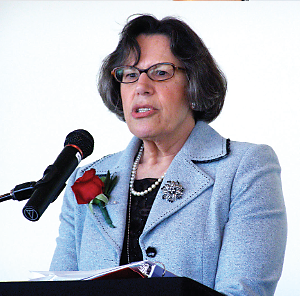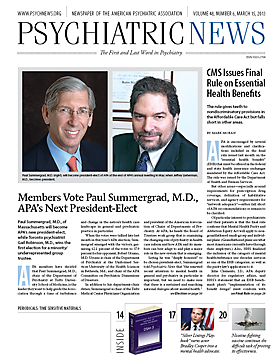Vivian Pender, M.D., a clinical associate professor of psychiatry at Weill-Cornell Medical College and a training and supervising psychoanalyst at the Columbia University Center for Psychoanalytic Training and Research, has a passion in addition to her professional responsibilities. She is an activist at the United Nations (U.N.).
“Actually, the U.N. is made up of three parts,” Pender explained during an interview with Psychiatric News. “There are 193 member states—South Sudan became a member state last year. There are some 100 U.N. agencies, programs, funds, commissions, and other entities such as the World Bank, the World Health Organization, U.N. Women, and UNICEF. And there are about 3,000 nongovernmental organizations (NGOs) that represent civil society and interface with the U.N.”
All three sectors work together to promote freedom, human rights, peace, and dignity for people throughout the world, Pender said. She has been active in two NGOs—the International Psychoanalytical Association and the Committee on the Status of Women—during the past 10 years.
The International Psychoanalytical Association, which has some 10,000 members from 30 countries, was granted NGO special consultative status by the U.N. in 1997. Pender is currently chair of the International Psychoanalytical Association’s U.N. Committee. The NGO Committee on the Status of Women, which was established in 1972, is made up of about 450 members, who in turn represent larger organizations, with ultimately millions of individuals worldwide. Pender is one of those 450 members, representing the International Psychoanalytical Association. Moreover, she was nominated and elected chair of the NGO Committee on the Status of Women and served from 2007 to 2011.
Position Opens Many Doors
Since the International Psychoanalytical Association is an NGO and Pender is chair of its U.N. Committee, she has a yearly pass so that she can attend just about any meeting within the U.N., including the Security Council and General Assembly.
“For example, about five years ago, I went to a meeting where they were talking about government-sanctioned rapes in the Congo,” she said. “I raised my hand and asked, ‘Has there been any thought given to the psychological consequences?’ They were focusing on the physical consequences. It got their attention. Another time, at a large meeting attended by representatives from some 100 countries, I made a formal three-minute statement elucidating the psychological consequences of violence against women on all of humanity.”
Pender and the four other psychoanalysts on the International Psychoanalytical Association’s U.N. Committee sometimes pay calls on the health ministers of various countries and urge them to provide better mental health care for their citizens. They might ask, for example, “What are you doing in terms of mental health? Are you providing education and services? Are you training people? Are you funding hospitals to care for people in a state of crisis? How do you care for people who experienced a natural disaster?”
Recently, she and her colleagues paid such calls on the health ministers of Armenia, Japan, Liberia, and Qatar—“countries that are a little more open to us talking to them than some others are,” she said. She would also like to pay a call on the health ministers and ambassadors of war-torn countries and ask some hard questions such as “What about the children who are experiencing or witnessing terrible violence? How can we help them?”
“As professionals, we have tools that we can offer them, but we can’t tell them what to do,” she said. “We can suggest, inform, raise their sensitivity, and sometimes ‘name and shame,’ but the most crucial thing is that we maintain a relationship with them. It requires diplomacy.”
Goal Is to Build Consensus
“Perhaps the most effective thing I can do,” Pender remarked, “is to bring various groups together to form a consensus. For example, if I can bring the health ministers of 50 governments together with psychiatrists, psychoanalysts, and women and talk about the education of girls or eliminating the trafficking of girls and women, it can lead to awareness of the problem, awaken interest in it, and hopefully lead to political will to improve their plight.”
Pender’s U.N. activism sometimes extends to APA as well. Recently, as an APA Area 2 Assembly member, she submitted two action papers asking APA to formally endorse United States ratification of the U.N. Convention on the Elimination of All Forms of Discrimination Against Women and United States ratification of the U.N. Convention on the Rights of the Child. APA agreed to do both.
“Most people don’t know about these international treaties,” she said, “but they are important because there are so many violations going on every day. And it’s not just in other countries. Women and children are being trafficked right here in New York City. There is apparently more money, billions of dollars, in trafficking humans than in trafficking drugs and arms. These international treaties can be used as legal mechanisms to help victims.”
As long as she’s a member of the International Psychoanalytical Association’s U.N. Committee, Pender plans on continuing her activism. “This is really wonderful volunteer work—lobbying for mental health and psychiatry around the world,” she exclaimed. “I love doing it and just wish I had more time and energy for it.” ■

